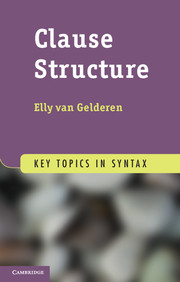7 - Conclusion: description, explanation, and “beyond”
Published online by Cambridge University Press: 05 June 2013
Summary
This book provides a Minimalist description of the clause. It uses three clausal domains that are quite distinct in their characteristics. One way of characterizing each layer is by using the term pragmatic for the CP, grammatical for the TP, and semantic for the VP, but that is of course an overgeneralization. Each of these three layers has been examined in detail, and a Cartography has emerged. What I have tried to emphasize, however, is that this Cartography is descriptive, i.e. it is descriptively adequate and is not an explanation for why the order of phrases is the way it is and how it came to be this way, i.e. how it is explanatorily adequate and “beyond” explanatorily adequate. Cartography and Minimalism are different ways of approaching the problem: the one is descriptive, the other explanatory.
I have therefore also suggested ways to envisage an explanation in terms of third factors, as is now common in Minimalism. Here, I have been much vaguer, and that’s why Minimalism is programmatic at this point. A complete account is not yet feasible. In addition to third factor effects, however, I have suggested a bigger role for Universal Grammar than is currently the case. Innate semantic concepts and features guide the child in its extraordinary acquisition of lexical items.
- Type
- Chapter
- Information
- Clause Structure , pp. 203 - 206Publisher: Cambridge University PressPrint publication year: 2013

